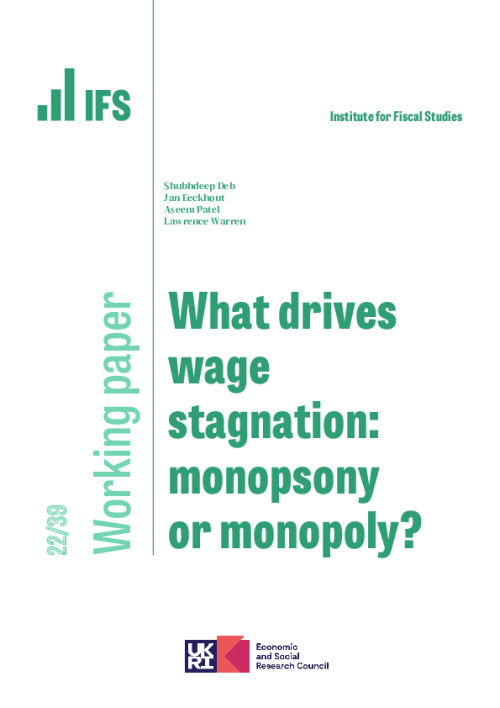Downloads

WP202239-What-drives-wage-stagnation-monopsony-or-monopoly.pdf
PDF | 864.63 KB
Wages for the vast majority of workers have stagnated since the 1980s while productivity has grown. We investigate two coexisting explanations based on rising market power: 1. Monopsony, where dominant firms exploit the limited mobility of their own workers to pay lower wages; and 2. Monopoly, where dominant firms charge too high prices for what they sell, which lowers production and the demand for labor, and hence equilibrium wages economy-wide. Using establishment data from the US Census Bureau between 1997 and 2016, we find evidence of both monopoly and monopsony, where the former is rising over this period and the latter is stable. Both contribute to the decoupling of productivity and wage growth, with monopoly being the primary determinant: in 2016 monopoly accounts for 75% of wage stagnation, monopsony for 25%.
Authors
Shubhdeep Deb
UPF Barcelona

Research Associate Pompeu Fabra University and Barcelona Graduate School of Economics
Jan is an IFS Research Associate, a Research Professor at the Barcelona School of Economics and an ICREA Research Professor at the UPF Barcelona.
Aseem Patel
University of Essex
Lawrence Warren
US Census Bureau
Working Paper details
- DOI
- 10.1920/wp.ifs.2022.3922
- Publisher
- Institute for Fiscal Studies
Suggested citation
Deb, S et al. (2022). What drives wage stagnation: monopsony or monopoly?. 22/39. London: Institute for Fiscal Studies. Available at: https://ifs.org.uk/publications/what-drives-wage-stagnation-monopsony-or-monopoly (accessed: 30 June 2024).
More from IFS
Understand this issue

Big firm, little firm: are differences between companies driving inequality and holding back growth?
30 August 2023

Still a man’s world? Gender inequalities, parenthood and the workplace
23 August 2023

Election Special: The UK economy since 2008
3 June 2024
Policy analysis

How do the last five years measure up on levelling up?
19 June 2024

The Conservatives and the Economy, 2010–24
3 June 2024

A decade and a half of historically poor growth has taken its toll
3 June 2024
Academic research

Labour market inequality and the changing life cycle profile of male and female wages
15 April 2024

The impact of labour demand shocks when occupational labour supplies are heterogeneous
28 June 2024

Interpreting cohort profiles of lifecycle earnings volatility
15 April 2024